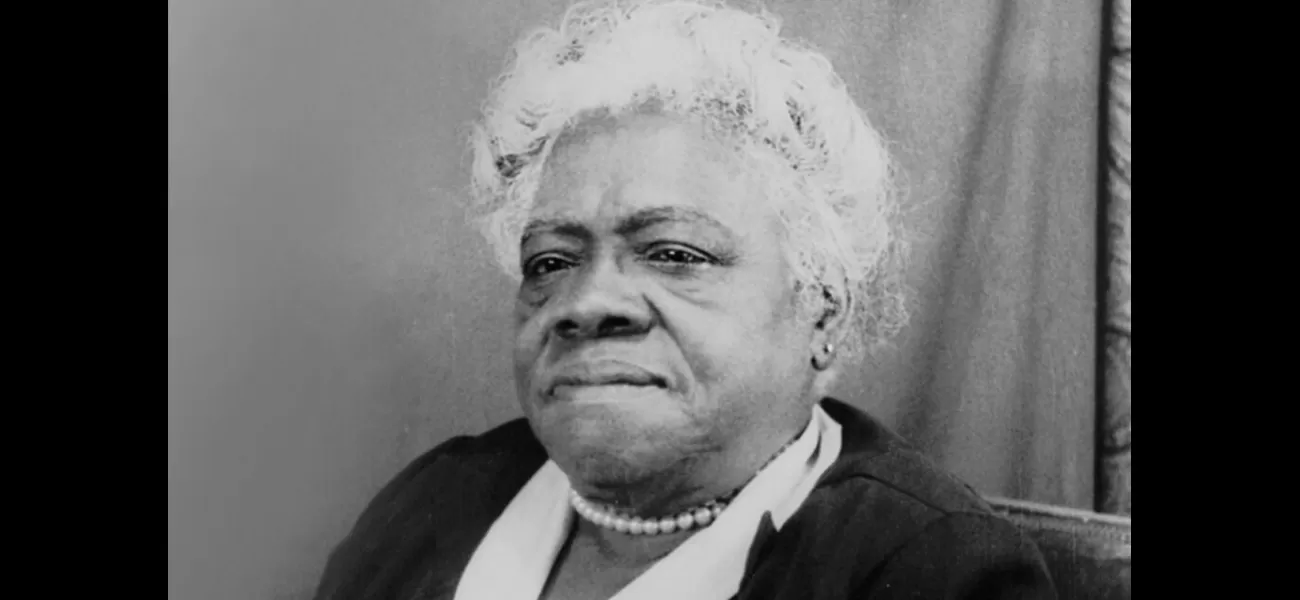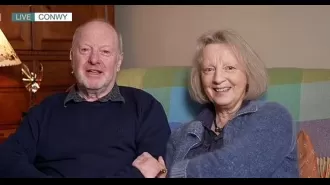Experience the enduring legacy of Mary McLeod Bethune at the NMAAHC's new exhibit.
New exhibit on Mary McLeod Bethune at the National Museum of African American History and Culture.
August 8th 2024.

The National Museum of African American History and Culture is paying tribute to the remarkable civil and women's rights advocate, Mary McLeod Bethune, through a captivating exhibit titled "Forces for Change: Mary McLeod Bethune and Black Women's Activism." The exhibit, which opened on July 19, is a wonderful opportunity for visitors to delve into the life and legacy of this renowned educator who founded the National Council of Negro Women in 1935. Located on Level 3, the gallery boasts 75 images, 35 artifacts, a multimedia film, and an interactive engagement. As guests make their way through the exhibit, they come face-to-face with an impressive 8-foot-tall plaster statue of Bethune, proudly holding a Black rose. Adorned in a graduation cap, stole, and gown, with heels and a pearl necklace and earrings to complete the ensemble, Bethune's presence is truly awe-inspiring.
This special gallery, known as the "Bethune Room," was first opened in 2016 as part of the permanent exhibition "Making a Way Out of No Way." It has now been reimagined in a dynamic new way, dedicated to the story of Bethune and the National Council of Negro Women. The Smithsonian's NMAAHC shared a sneak peek of the exhibit on Twitter, showcasing the stunning statue and inviting visitors to come and experience it for themselves.
Mary McLeod Bethune, born on July 10, 1875, in South Carolina, was the youngest of 17 children to parents Samuel and Patsy McLeod. She attended Scotia Seminary, a prestigious boarding school in North Carolina, and upon her graduation in 1894, she joined Dwight Moody's Institute for Home and Foreign Missions in Chicago. Despite facing rejections from several churches while seeking sponsorship as a missionary, Bethune persevered and found her calling as an educator.
Following her marriage to educator Albertus Bethune and the birth of their son in 1899, Bethune moved to Palatka, Florida. However, a divorce in 1904 led her to establish her own boarding school, the Daytona Beach Literary and Industrial School for Training Negro Girls, which eventually became a college and merged with an all-male institute. Today, this institution is known as Bethune Cookman, a private historically Black university in Daytona. Bethune's determination and resilience in the face of adversity are truly inspiring.
Bethune's activism and advocacy for racial and gender equality have left a lasting impact on the advancement of women and the Black community. As the founder of the NCNW, she established an organization dedicated to empowering and advocating for women of African descent. With over 330 campuses and a network of over two million people, this non-profit organization continues to provide valuable resources on education, entrepreneurship, financial literacy, healthcare, and social justice.
In addition to her work with the NCNW, Bethune held leadership roles in various organizations, including the National Association of Colored Women's Clubs, the Negro Affairs of the National Youth Administration, former president Franklin D. Roosevelt's unofficial "black cabinet," and the National Association for the Advancement of Colored Persons. She was also instrumental in leading voter registration drives, fighting to end lynching, and creating a racially integrated Women's Army Corps. Bethune's dedication to the cause of equality was recognized by her invitation to the United Nations' founding conference in 1945, making her the only Black woman in attendance.
In a historic ceremony in 2022, Bethune was honored as the first Black American to have a state statue in the National Statuary Hall at the U.S. Capitol, replacing Confederate States Army General Edmund Kirby Smith. Along with the NMAAHC's reimagining of the "Bethune Room," the gallery also features other influential Black women activists, such as Stacey Abrams and Children's Defense Fund founder Marian Wright Edelman. The exhibit is a beautiful celebration of Bethune's legacy and the enduring impact of Black women in the fight for equality.
This special gallery, known as the "Bethune Room," was first opened in 2016 as part of the permanent exhibition "Making a Way Out of No Way." It has now been reimagined in a dynamic new way, dedicated to the story of Bethune and the National Council of Negro Women. The Smithsonian's NMAAHC shared a sneak peek of the exhibit on Twitter, showcasing the stunning statue and inviting visitors to come and experience it for themselves.
Mary McLeod Bethune, born on July 10, 1875, in South Carolina, was the youngest of 17 children to parents Samuel and Patsy McLeod. She attended Scotia Seminary, a prestigious boarding school in North Carolina, and upon her graduation in 1894, she joined Dwight Moody's Institute for Home and Foreign Missions in Chicago. Despite facing rejections from several churches while seeking sponsorship as a missionary, Bethune persevered and found her calling as an educator.
Following her marriage to educator Albertus Bethune and the birth of their son in 1899, Bethune moved to Palatka, Florida. However, a divorce in 1904 led her to establish her own boarding school, the Daytona Beach Literary and Industrial School for Training Negro Girls, which eventually became a college and merged with an all-male institute. Today, this institution is known as Bethune Cookman, a private historically Black university in Daytona. Bethune's determination and resilience in the face of adversity are truly inspiring.
Bethune's activism and advocacy for racial and gender equality have left a lasting impact on the advancement of women and the Black community. As the founder of the NCNW, she established an organization dedicated to empowering and advocating for women of African descent. With over 330 campuses and a network of over two million people, this non-profit organization continues to provide valuable resources on education, entrepreneurship, financial literacy, healthcare, and social justice.
In addition to her work with the NCNW, Bethune held leadership roles in various organizations, including the National Association of Colored Women's Clubs, the Negro Affairs of the National Youth Administration, former president Franklin D. Roosevelt's unofficial "black cabinet," and the National Association for the Advancement of Colored Persons. She was also instrumental in leading voter registration drives, fighting to end lynching, and creating a racially integrated Women's Army Corps. Bethune's dedication to the cause of equality was recognized by her invitation to the United Nations' founding conference in 1945, making her the only Black woman in attendance.
In a historic ceremony in 2022, Bethune was honored as the first Black American to have a state statue in the National Statuary Hall at the U.S. Capitol, replacing Confederate States Army General Edmund Kirby Smith. Along with the NMAAHC's reimagining of the "Bethune Room," the gallery also features other influential Black women activists, such as Stacey Abrams and Children's Defense Fund founder Marian Wright Edelman. The exhibit is a beautiful celebration of Bethune's legacy and the enduring impact of Black women in the fight for equality.
[This article has been trending online recently and has been generated with AI. Your feed is customized.]
[Generative AI is experimental.]
0
0
Submit Comment





